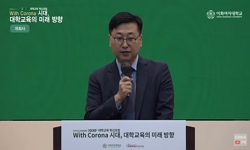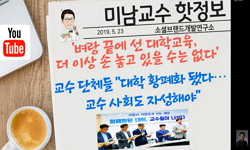Due to the impact of COVID-19 pandemic, online learning environments are more prevalent in higher education than ever before. Many instructors are attempting to emulate traditional instructional methods in the online learning environment as much as po...
http://chineseinput.net/에서 pinyin(병음)방식으로 중국어를 변환할 수 있습니다.
변환된 중국어를 복사하여 사용하시면 됩니다.
- 中文 을 입력하시려면 zhongwen을 입력하시고 space를누르시면됩니다.
- 北京 을 입력하시려면 beijing을 입력하시고 space를 누르시면 됩니다.

비실시간 비디오 강의와 실시간 웹 컨퍼런싱 강의: 학습자 인식 = Asynchronous Video Lectures and Synchronous Interactive Web Conferencing Lectures: Student Perceptions
한글로보기부가정보
다국어 초록 (Multilingual Abstract)
Due to the impact of COVID-19 pandemic, online learning environments are more prevalent in higher education than ever before. Many instructors are attempting to emulate traditional instructional methods in the online learning environment as much as possible. Online classes are mainly separated into two categories, (1) synchronous online; and (2) asynchronous online, depending on the nature of the online tool. This study aims to compare asynchronous online environments and synchronous web conferencing environments and their effect on learning experience and satisfaction of students. Participants of the study were 115 students enrolled in 3 team-teaching classes at A University in Cheung-cheong area. The students received instruction in two different types of online learning environments: asynchronous video lectures using Moodle and synchronous web conferencing lectures using Webex. Web-based questionnaires were employed to examine students’ perceptions of synchronous and asynchronous online learning as well as their needs to class forms in the post-COVID era. Descriptive statistics were used to analyze the responses of the students. The results of this analysis suggest that both types of lectures are effective in delivering online instruction. Overall, students noted some positive features of both types of lectures such as comfortable educational environments and efficient time utilization, while network instability, and reduced concentration were shown to be their primary causes of dissatisfaction. The findings also revealed that students preferred asynchronous video lectures in terms of interests, engagement, and efficiency. This finding iterates the importance of repetitive learning on student satisfaction in a course. From these findings, pedagogical implications are briefly discussed and ways of maximizing the effects of online courses are suggested.
참고문헌 (Reference)
1 박연정, "학습관리시스템의 대시보드 설계를 위한 학습자 중심 요구분석: 분석과 설계 도구로서 활동이론의 적용" 한국교육공학회 30 (30): 221-258, 2014
2 남창우, "포스트 코로나 공학교육에 대한 소고(小考)포스트 코로나 교육의 대전환을 위한 공학교육의 중단기적 계획" 27 (27): 31-33, 2020
3 이용상, "코로나19로 인한 언택트 시대의 온라인 교육 실태 연구" 한국교육과정평가원 23 (23): 39-57, 2020
4 김경아, "코로나19, 위기를 기회로 바꾼 온라인 영어수업 어떻게 할까요?" 56-56, 2020
5 박은경, "코로나19 확산에 따른 온라인 교양영어 수업에서 학생들이 느끼는 불안감에 대한 인식조사" 한국멀티미디어언어교육학회 23 (23): 320-338, 2020
6 한국대학신문, "코로나19 전 세계 강타 … 원격수업 급부상"
7 권순정, "코로나19 이후 교육의 과제: 재조명되는 격차와 불평등, 그리고 학교의 역할" 서울특별시교육청교육연구정보원 교육정책연구소 2020
8 정향기, "코로나19 상황의 대학교육에 있어서 전면적 온라인 수업 실행 및 평가에 대한 학습자 만족도" 한국멀티미디어언어교육학회 23 (23): 392-412, 2020
9 이동주, "코로나19 상황에서의 대학 온라인 원격교육 실태와 개선 방안" 한국멀티미디어언어교육학회 23 (23): 359-377, 2020
10 성지윤, "초임교사가 마주한 온라인 영어 수업에서의 어려움과 극복방법" 57-58, 2020
1 박연정, "학습관리시스템의 대시보드 설계를 위한 학습자 중심 요구분석: 분석과 설계 도구로서 활동이론의 적용" 한국교육공학회 30 (30): 221-258, 2014
2 남창우, "포스트 코로나 공학교육에 대한 소고(小考)포스트 코로나 교육의 대전환을 위한 공학교육의 중단기적 계획" 27 (27): 31-33, 2020
3 이용상, "코로나19로 인한 언택트 시대의 온라인 교육 실태 연구" 한국교육과정평가원 23 (23): 39-57, 2020
4 김경아, "코로나19, 위기를 기회로 바꾼 온라인 영어수업 어떻게 할까요?" 56-56, 2020
5 박은경, "코로나19 확산에 따른 온라인 교양영어 수업에서 학생들이 느끼는 불안감에 대한 인식조사" 한국멀티미디어언어교육학회 23 (23): 320-338, 2020
6 한국대학신문, "코로나19 전 세계 강타 … 원격수업 급부상"
7 권순정, "코로나19 이후 교육의 과제: 재조명되는 격차와 불평등, 그리고 학교의 역할" 서울특별시교육청교육연구정보원 교육정책연구소 2020
8 정향기, "코로나19 상황의 대학교육에 있어서 전면적 온라인 수업 실행 및 평가에 대한 학습자 만족도" 한국멀티미디어언어교육학회 23 (23): 392-412, 2020
9 이동주, "코로나19 상황에서의 대학 온라인 원격교육 실태와 개선 방안" 한국멀티미디어언어교육학회 23 (23): 359-377, 2020
10 성지윤, "초임교사가 마주한 온라인 영어 수업에서의 어려움과 극복방법" 57-58, 2020
11 오지수, "초등영어 온라인 수업: 도전과 극복, 남은 과제" 63-63, 2020
12 교육부, "체계적인 원격수업을 위한 운영기준안 마련"
13 신은진, "일본어수업 블렌디드러닝 실천연구- 교직과목 “논리와 논술”의 LMS활용 -" 한국일어교육학회 (45) : 77-93, 2018
14 최수정, "이러닝시스템의 매체풍부성, 매체유용성, 매체경험이 학습자 만족에 미치는 영향" 한국데이터전략학회 14 (14): 27-48, 2007
15 백이연, "온라인 수업에 대한 대학생의 인식 조사 : 교양 일본어 수업을 대상으로 " 한국일어교육학회 (52) : 59-74, 2020
16 안정은, "언택트 영어교실에서 컨택트하기" 62-62, 2020
17 송수연, "언택트 시대의 대학교육: 코로나19에 따른 비대면 강의 만족도와 수강지속 의사에 영향을 미치는 요인에 관한 연구" 교육연구소 21 (21): 1099-1126, 2020
18 이선미, "실시간 원격 영어수업을 위한 수업 설계 및 실제" 54-55, 2020
19 최정선, "실시간 온라인 수업에 대한 교수자의 인식 및 만족도 연구 : D대학교 한국어 교육기관의 사례를 중심으로" 동악어문학회 (81) : 135-168, 2020
20 한송이, "실시간 온라인 수업에 대한 교수자 인식 연구: A 대학의 사례를 중심으로" 한국문화융합학회 42 (42): 395-418, 2020
21 전미현, "소통 교육을 위한 학습관리시스템" 37-42, 2014
22 도재우, "면대면 수업의 온라인 수업 전환과정에서 발생하는 설계 장애물에 대한 탐색" 교육연구소 26 (26): 153-173, 2020
23 유인식, "고등교육에서 Moodle을 이용한 LMS 구축" 30 (30): 63-69, 2012
24 이인숙, "e러닝 : 사이버공간의 새로운 패러다임" 문음사 2002
25 장이분, "Teacher Reflection on Emergency Remote Teaching (ERT) during the Coronavirus Pandemic in a Multicultural EAP Classroom in South Korea" 한국멀티미디어언어교육학회 23 (23): 235-257, 2020
26 Colpaert, J., "Pedagogy-driven design for online language teaching and learning" 23 (23): 477-497, 2006
27 Hodgson, P., "How to teach in cyberspace" 74 (74): 34-36, 1999
28 Bloom, B. S., "Effective instruction" Association for Supervision and Curriculum Development 1981
29 Zimmerman, J., "Coronavirus and the great online learning experiment" The Chronicle of Higher Education
30 Flottemesch, K., "Building effective interaction in distance education: A review of literature" 46-51, 2000
동일학술지(권/호) 다른 논문
-
블렌디드 러닝 기반의 공연 작품 제작 실기 수업 사례 연구
- 한국문화융합학회
- 김준
- 2021
- KCI등재
-
학습 성취도와 교수자의 학업적 지원이 프로그래밍 학습 계속의도에 미치는 영향- 비전공자를 대상으로 한 프로그래밍 수업 사례 연구
- 한국문화융합학회
- 이경숙
- 2021
- KCI등재
-
교수역량 지원 프로그램에 대한 교원의 인식 - K대학 사례
- 한국문화융합학회
- 윤혜림
- 2021
- KCI등재
-
- 한국문화융합학회
- 김은경
- 2021
- KCI등재
분석정보
인용정보 인용지수 설명보기
학술지 이력
| 연월일 | 이력구분 | 이력상세 | 등재구분 |
|---|---|---|---|
| 2026 | 평가예정 | 재인증평가 신청대상 (재인증) | |
| 2022-03-24 | 학술지명변경 | 한글명 : 문화와 융합 -> 문화와융합 |  |
| 2022-03-16 | 학회명변경 | 영문명 : The Korean Society of Culture and Convergence -> The Society of Korean Culture and Convergence |  |
| 2020-01-01 | 평가 | 등재학술지 유지 (재인증) |  |
| 2017-01-01 | 평가 | 등재학술지 선정 (계속평가) |  |
| 2015-01-01 | 평가 | 등재후보학술지 선정 (신규평가) |  |
| 2014-03-04 | 학회명변경 | 한글명 : 문학과언어학회 -> 한국문화융합학회영문명 : Munhak Kwa Eoneo Hakhoi -> The Korean Society of Culture and Convergence |
학술지 인용정보
| 기준연도 | WOS-KCI 통합IF(2년) | KCIF(2년) | KCIF(3년) |
|---|---|---|---|
| 2016 | 0 | 0 | 0 |
| KCIF(4년) | KCIF(5년) | 중심성지수(3년) | 즉시성지수 |
| 0 | 0 | 0 | 0.13 |




 DBpia
DBpia






